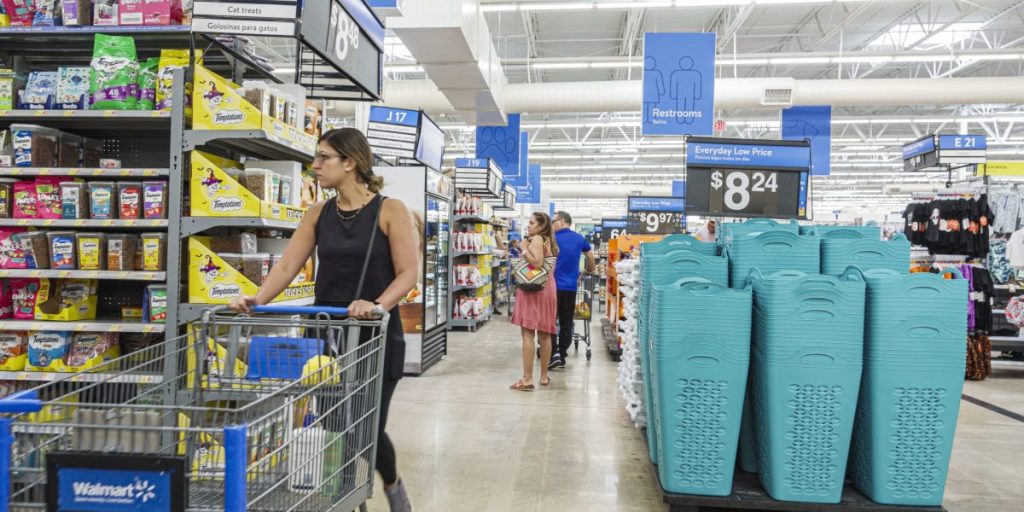
Economists have been looking for cracks in U.S. consumer spending for years amid persistent inflation and higher interest rates, but until recently Americans have defied the odds at every turn. Despite consistent recession forecasts and gloomy consumer sentiment figures driven by soaring costs of living, Americans have until recently managed to continue spending at record levels. However, in April, the growth of retail sales completely stopped. And now earnings reports from major retailers have revealed some stark warning signs about the health of the American consumer.
First, to be clear, Walmart won. The retail giant beat Wall Street’s first-quarter profit and revenue forecasts, reporting adjusted earnings per share of $0.60 versus expectations of $0.52 and revenue of $161.5 billion, topping estimates of $159.5 billion. e-commerce and spending by high-income customers helped support results. But the company has also witnessed a key spending pattern that typically occurs when consumers feel financial stress: a shift from spending on wants to spending on needs.
As Walmart CFO John D. Rainey explained on a call with analysts on May 16, “Many consumers are still stretched in their wallets, and we’re seeing the effect of that in our business as they spend more of their paychecks on non-discretionary needs.” category and less for general merchandise.”
Walmart said it has increased the number of price cuts, or rollbacks, it offers on key items to boost sales, in part because, as Rainey reiterated on the call, “wallets have been stretched.” When Morgan Stanley analyst Simeon Gutman asked why he declined to raise Walmart’s earnings forecast, Rainey also gave a telling response, highlighting his uncertainty about consumer spending.
“I think we can all agree that we are away from the defined environment around the consumer. Consumer health is something we read about every single day, and given that we’re already one quarter in, we just want to be patient,” the CFO said.
Walmart wasn’t alone in raising concerns about consumer health in its first-quarter earnings report. In the first few months of 2024, Target’s net sales fell 3.1% year-over-year to $24.5 billion and also missed earnings estimates, with diluted earnings per share of $2.03 versus forecasts of $2.05. Inflation-weary shoppers turned to essentials during the quarter, sending sales and earnings down, Target said.
In a subsequent call with reporters, Chairman and CEO Brian Cornell said Target shoppers’ “biggest concerns” are “inflation in food and household items.” Yahoo Finance reported. Cornell even added that in response to Walmart CFO John Rainey’s comments, there was a “strain on the consumer’s wallet.”
Target saw comparable physical store sales decline 4.8% in the first quarter as shoppers looked for cheaper options, with only a slight increase in online comparable sales. To prevent further decline in sales, the company unveiled a plan to cut prices on nearly 5,000 everyday items such as food and diapers.
But during Target’s call with analysts on Wednesday, chief growth officer Christina Hennington noted that she is paying close attention to consumers’ ongoing financial strain to determine the right path for the company, signaling that price cuts may not be enough to reignite growth.
“The sustained level of price increases has had a significant impact on the budgets and savings of many families,” Hennington said. “Currently, one in three Americans has maxed out or is approaching the limit on at least one of their credit cards. For these and other reasons, we remain cautious about our near-term growth prospects.”


